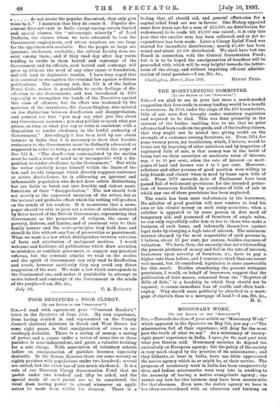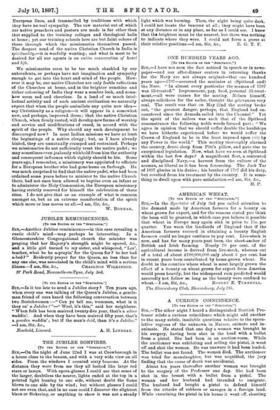MISSIONARY WORK.
[To THE EDITOR OF THE "8PECTATOR:1
Sin,—Towards the close of your article on "Missionary Work"' which appeared in the Spectator on May 8th, you say :—" The missionaries, full of their experience, will deny for the most part the truth of what we say." As a missionary of twenty- eight years' experience in India, I agree for the most part with what you therein said. Missionary societies do depend too exclusively on European agency; but the policy of the society is very much shaped by the practice of its missionaries ; anti they hitherto, at least in India, have too little appreciated the native agency which is, or might be, at their service. The progress of missionary work in India has been comparatively slow, and Indian missionaries were very late in awaking to the necessity of having a native evangelistic agency ; one cannot say how far this lateness may have been accountable for that slowness. Even now, the native agency we have is too often overburdened with an education and training on
European lines, and trammelled by traditions with which they have no real sympathy. The raw material out of which our native preachers and pastors are made is far other than that supplied to the training colleges and theological halls at home ; yet our training schools here are but faint echoes of those through which the missionaries themselves passed. The deepest need of the native Christian Church in India is spirituality,—it is woefully wanting; and what is most to be desired for all our agents is an entire consecration of heart and life.
We missionaries seem to be too much shackled by our antecedents, or perhaps have not imagination and sympathy enough to get into the heart and mind of the people. How- ever it may be, our native Churches are only feeble reflections of the Churches at home, and in the brighter sunshine and richer colouring of India they wear a sombre look, and some- lsow seem sad and cheerless. In a land of so much intel- lectual activity and of such ancient civilisation we naturally expect that when the people assimilate any quite new idea— say Christianity as a religion—it will appear in a somewhat new, and perhaps, improved dress ; that the native Christian Church, when firmly rooted, will develop new forms of worship and service and modifications of creed, in accord with the spirit of the people. Why should any such development be discouraged now P In most Indian missions we have at least the beginnings of a native clergy; but, as I have already hinted, they are unnatually cramped and restrained. Perhaps we missionaries do not sufficiently trust the native padri ; we may sometimes even jealously withhold from him the authority and consequent influence which rightly should be his. Some years ago, I remember, a missionary was appointed to officiate for a European brother who had gone home on furlough. He was much surprised to find that the native padri, who had been ordained some years before to minister to the native Church there, had not once been allowed to baptise even an infant or to administer the Holy Communion, the European missionary having strictly reserved for himself the celebration of those rites. I do not give that as an example of what is common amongst us, but as an extreme manifestation of the spirit which more or lees moves us all.—I am, Sir, &c., W. BONNAR.



































 Previous page
Previous page